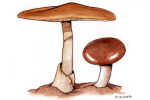
Last year I came across a small scale study on using Active Hexose Correlated Compound (AHCC) to treat HPV, which causes warts. From the study:
https://www.ncbi.nlm.nih.gov/pmc/articles/PMC6435520/ said:Results: HR-HPV clearance was observed in vitro and confirmed in the animal studies as a durable response. Four of six (66.7%) patients had confirmed HR-HPV clearance after 3–6 months of AHCC 3g. Similarly, 4 of 9 (44%) patients had confirmed HR-HPV clearance after 7 months of AHCC 1g. Suppression of IFNβ <25 pg/mL was observed in those clearing the HR-HPV infection.
Conclusion: Pre-clinical in vitro and in vivo studies demonstrated durable clearance of HR-HPV infections. The preliminary data from the two pilot studies suggested that AHCC supplementation supports the host immune system for successful clearance of HR-HPV infections. A confirmatory phase II randomized, double-blinded, placebo-controlled study is ongoing.
As you can see it was a small pilot study, but the results were promising enough to warrant a larger study. AHCC is a proprietary extract from Basidiomycete mushrooms (a family including shiitake mushrooms). The product contains polysaccharides called glucans that studies show work as an immune system modulator and to have anti tumor effects. I found a very accessible summary article here: Are Japanese mushrooms the cure for HPV?
https://www.foxnews.com/health/are-japanese-mushrooms-the-cure-for-hpv said:In the study, 10 HPV-positive women were treated orally with the Japanese mushroom extract active hexose correlated compound (AHCC) once daily for six months. Five achieved a negative HPV test result— three with confirmed eradication after stopping AHCC. The remaining two responders are continuing to participate in the ongoing study.
[...]
“I had originally looked into AHCC for its anti-tumor benefits,” Smith said of the decade-long research process. “Then as I learned more about its activity against various virus strains, I connected the dots to my cervical cancer research and HPV and thought of the big picture: a nutritional supplement to treat HPV infections would be an incredible, safe option and could easily be used to treat infections before they turn into cancer.”
HPV is associated with more than 99 percent of cervical cancers, and according to the Centers for Disease Control and Prevention (CDC) it is also linked to several other types of the disease including cervical, vulvar, vaginal, penile, anal, and throat cancer.
[...]
AHCC is a readily available nutritional supplement that uses the body's own immune system to help fight disease. Human and preclinical studies have shown that AHCC increases the number and activity of Natural Killer cells, dendritic cells and cytokines, which help the body fight off infections and block tumor growth. The extract showed no negative side effects in the trial.
Since then I've used AHCC to successfully treat warts in 2 different patients and in both cases it worked very quickly (6 weeks in one case, 2-3 months in the 2nd case) with no side effects.
There's information on the Memorial Sloan Kittering Cancer Center website about existing evidence for using AHCC to treat cancer tumors: AHCC
https://www.mskcc.org/cancer-care/integrative-medicine/herbs/ahcc said:Active hexose correlated compound (AHCC) is an extract of mushrooms from the Basidiomycete class, including shiitake mushrooms. This product contains polysaccharides called glucans, which scientists think are responsible for its biological activity.
Lab studies suggest AHCC may enhance the activity of some types of immune cells. Animal studies suggest that AHCC has antioxidant and anti-inflammatory effects, and may improve immune system response in mice with chemotherapy-weakened immune systems. In a few human studies, AHCC improved liver function in patients with hepatocellular carcinoma and cirrhosis, and reduced blood levels of some tumor markers.
[...]
Active hexose correlated compound (AHCC) is a nutritional product prepared from the mycelia of shiitake (Lentinus edodes) mushrooms. Like other mushrooms, it contains a mixture of polysaccharides, amino acids, and minerals. AHCC is also rich in alpha-1,4-glucan oligosaccharides, which are believed to enhance its biologic activities (5). Patients use AHCC to prevent and treat cancer.
Animal models suggest that AHCC has antioxidant effects and may protect against disorders induced by oxidative stress (1). It also enhanced resistance against bacterial (3) and viral infections (4), and has anti-inflammatory effects against colitis (20). In healthy human subjects, AHCC improved T-cell immune responses (19), increased dendritic cell number and function (6), and improved antibody response to influenza vaccine (21).
Preclinical findings suggest anticancer effects (7) (8) (29). In cisplatin-treated mice, AHCC increased antitumor activity while reducing side effects (9), and showed synergistic effects with gemcitabine in pancreatic cancer cells (22). In humans, findings from a prospective cohort study suggest AHCC improved prognosis after curative resection of hepatocellular carcinoma (10). AHCC may also reduce chemotherapy-associated adverse effects in patients with advanced cancer (23), and in those with pancreatic ductal adenocarcinoma (PDAC) (25). However, an open-label multicenter study of patients with early stage prostate cancer found AHCC was ineffective in reducing prostate-specific antigen levels by 50% or more (11). Further research is needed.
Perhaps this compound is effective against tumors that are caused or triggered by HPV and similar viruses. That may be why study results have been mixed since at this point biomedicine differentiates based on the location of the cancer (ie prostate vs breast cancer) but not the cause of the cancer (ie viral vs fungal vs chemical triggers, etc).
Edits: I posted this before I was finished by mistake so I used the edit button to finish it.
Last edited:
